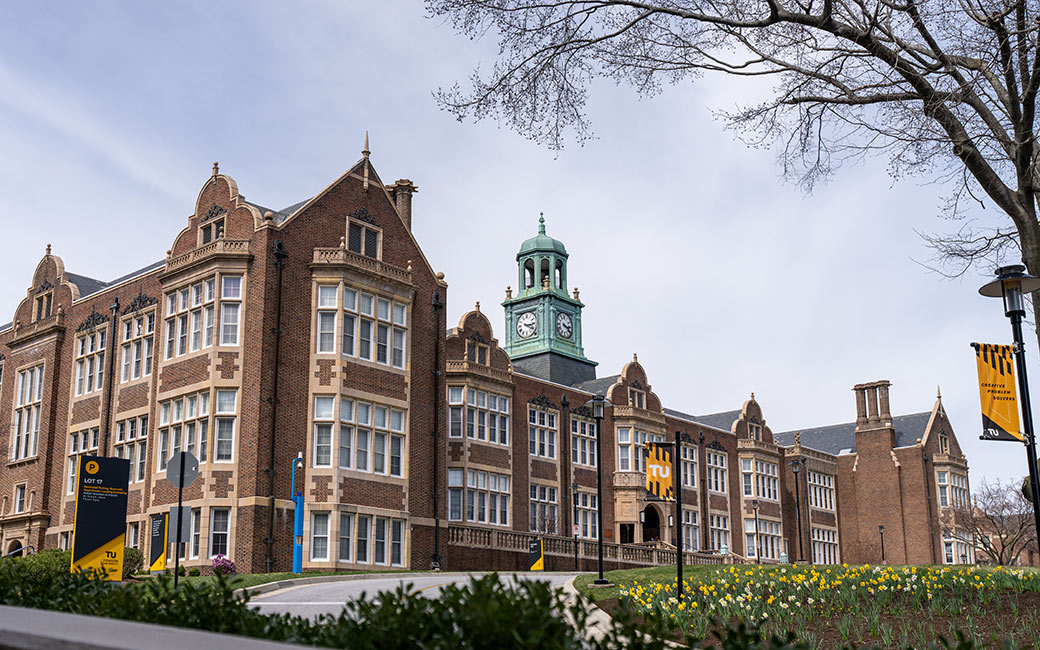How TU protects free expression
And why that means you might hear messages you don't agree with
By Pamela Gorsuch on May 1, 2024

The free expression of ideas is foundational to learning. It enables meaningful dialogue, helps us uncover new viewpoints and even sparks ideas. Protecting this freedom is both essential to the academic mission and a Constitutional requirement for public entities like TU. So how do we support civic expression while maintaining an inclusive campus climate? Read on for the roadmap TU’s following—including what is and isn’t covered by free speech protections and the guidelines for expressive activities on campus.
What freedom of speech covers
The U.S. Constitution’s First Amendment broadly protects the freedom of speech and
expression. While there are limited exceptions, even speech that’s considered offensive
and hateful has been ruled as protected. According to Supreme Court scholar and assistant
professor of political science Jonathan Hensley, the amendment’s broad interpretation
recognizes that there are, and always have been, differing opinions on what’s offensive.
“One person’s restriction on freedom of speech might be reasonable to some of us and
totally unreasonable to others,” says Hensley, who teaches in the College of Liberal
Arts. “The solution our legal system adopted is to have broad protections, so you
don’t have to have someone deciding what speech is and isn’t allowed.”
Instead, the federal protections encourage a marketplace of ideas in which citizens
decide for themselves what ideas are worth attention and discussion. TU fully supports
this freedom with the understanding that exposure to diverse perspectives can be an
essential part of the educational experience.
“Many of us are bothered by some of the things people say that are protected as free
speech, and that’s understandable,” Hensley says. “The important thing is to learn
to distinguish between things we have a right to say and ideas that are good.”
What it doesn’t cover
Speech that contains imminent threats of violence, defamation or unlawful harassment are among the exceptions to First Amendment protections. Courts have also made a clear distinction between freedom of expression and conduct. While expressing views is broadly protected, behavior such as vandalism, trespassing and assault is not.
“It’s important to remember that we can disagree on ideas without being personally disagreeable toward each other,” Hensley says.
Toward this end, all TU students pledge to uphold the Code of Student Accountability, which contributes to a culture of civility, fairness and responsibility. Faculty and staff also commit to professional conduct through University System of Maryland and TU policies and guidelines. Students, faculty and staff are encouraged to report hate/bias incidents to the Office of Inclusion & Institutional Equity, which responds to and conducts inquiries into all reports. The Counseling Center is also available to support those affected by hateful or offensive, but protected, speech.
How to exercise your rights
The Office of Civic Engagement and Social Responsibility (CESR) hosts a community conversation series to give students, faculty and staff the opportunity to engage in dialogue on issues that impact them. The series is led by trained facilitators who help participants explore their connections to the issue and the impacts it has on our community, then collectively envision a path forward.
Citizens also have the right to speak out and demonstrate, and public entities have the right to put reasonable limitations on those demonstrations—often for the safety of those involved. TU’s Time, Place and Manner Policy offers guidelines for expressive activities on campus. It outlines designated demonstration areas for university affiliates and non-affiliates, the process for reserving demonstration space, and guidelines on sound amplification and sign materials to prevent disrupting classes or posing risks to public safety. The guidelines apply to all expressive activities regardless of viewpoint or subject matter. TU encourages members of the campus community to follow the guidelines to express themselves safely and freely.
“We want to create opportunities for meaningful dialogue with people of all viewpoints,” says Romy Hübler, director of civic engagement & social responsibility. “The point is not to necessarily come to the same conclusion as others but to practice listening, share personal stories and begin to understand the complex histories and experiences that shape our ideas.”
Learn more
Practice Safe Activism
Visit TU's Safe Activism website to access additional resources for expressive activities on campus, including a list of Tiger Advocacy Advisory Team members who support and advise student activists in safely planning and executing expressive activities on campus.